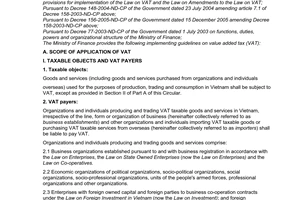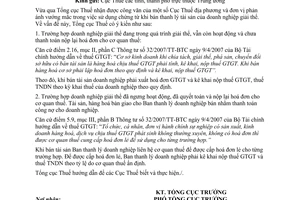Nội dung toàn văn Official Dispatch No. 1848/TCT-CS on the use of asset-selling invoices of dissol
|
MINISTRY OF FINANCE |
SOCIALIST REPUBLIC OF VIET NAM |
|
No. 1848/TCT-CS |
Hanoi, May 14, 2008 |
OFFICIAL LETTER
ON THE USE OF ASSET-SELLING INVOICES OF DISSOLVED ENTERPRISES
To: Provincial/municipal Tax Departments
The General Department of Taxation has received official letters of several Tax Departments and units, reporting some problems in using vouchers when selling liquidated assets of dissolved enterprises. Concerning this matter, the General Department of Taxation gives the following opinions:
1. In case enterprises, in the dissolution process, are still operational and fail to submit their settled invoices to tax offices:
Point 2.16, Section II, Part C of the Finance Ministry’s Circular No. 32/2007/TT-BTC of April 9, 2007, guiding the value-added tax (VAT) stipulates: “Business establishments, upon their division, spit-up, dissolution, bankruptcy or ownership transformation, when selling assets being goods liable to VAT, shall calculate, declare and pay VAT thereon. When selling these goods, they shall make invoices as prescribed, and declare and pay VAT thereon”.
Accordingly, enterprises, when selling their assets, shall issue value-added invoices, and declare and pay VAT and business income tax due in their tax declaration periods under regulations.
2. In case dissolved enterprises have terminated their operation, settled and submitted their invoices to tax offices, their assets and goods shall be handed over to the Enterprise Liquidation Board for sale in order to pay their debts.
Point 5.9, Section III, Part B of the Finance Minister’s Circular No. 32/2007/TT-BTC of April 9, 2007, guiding value-added tax (VAT), stipulates: “Organizations, individuals and administrative non-business units engaged in production of and trading in products and services liable to VAT, on an irregular basis and without invoices shall receive separate invoices from tax offices for use in specific case”.
When selling assets, the Enterprise Liquidation Board shall contact tax offices to be supplied with separate invoices for use in each specific case. For being supplied with separate invoices, the Board shall declare and pay VAT and business income tax at rates set by tax offices.
The General Department of Taxation gives this guidance to Tax Departments for information and implementation.
|
|
FOR THE GENERAL DIRECTOR OF
TAXATION |

